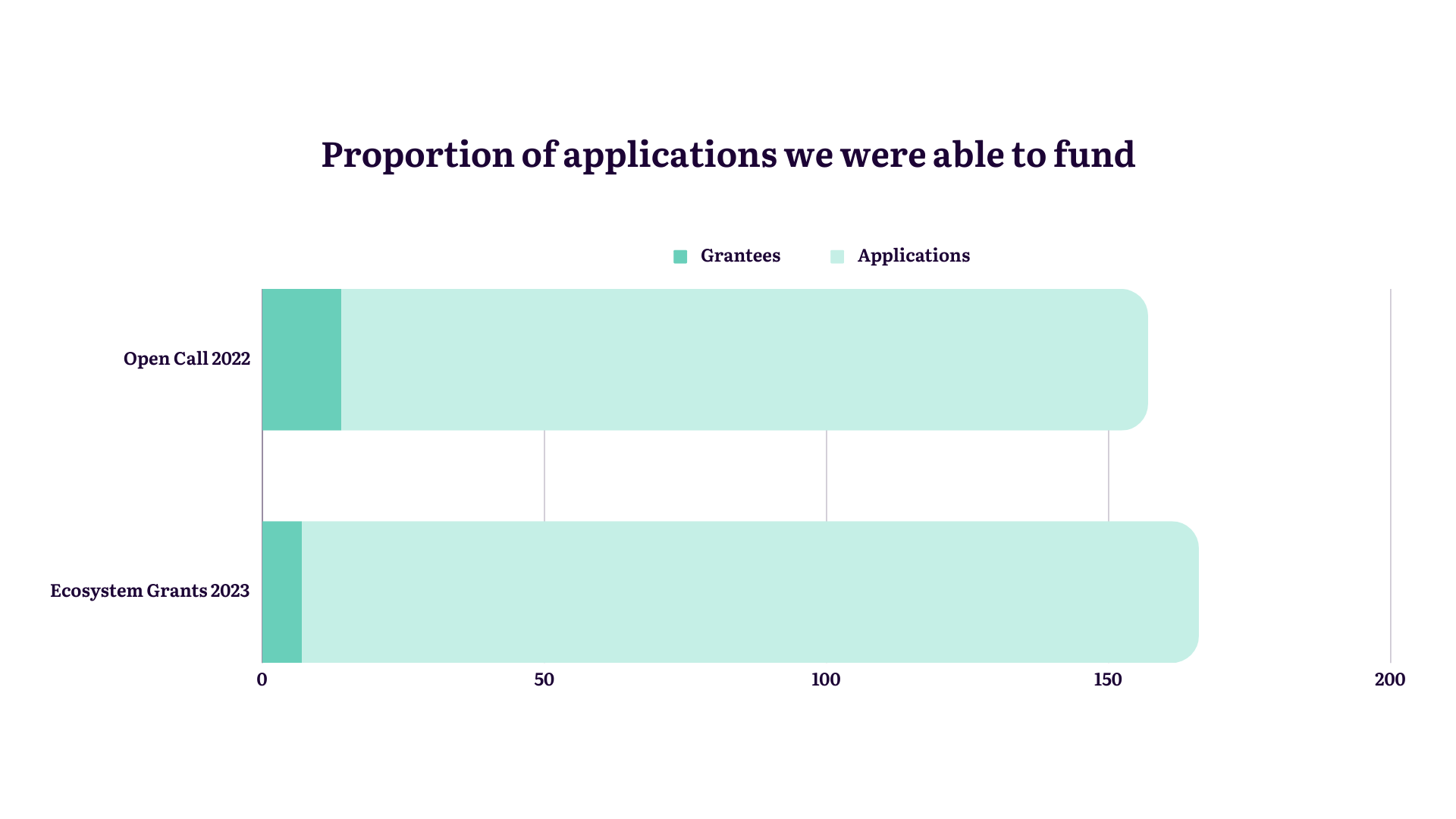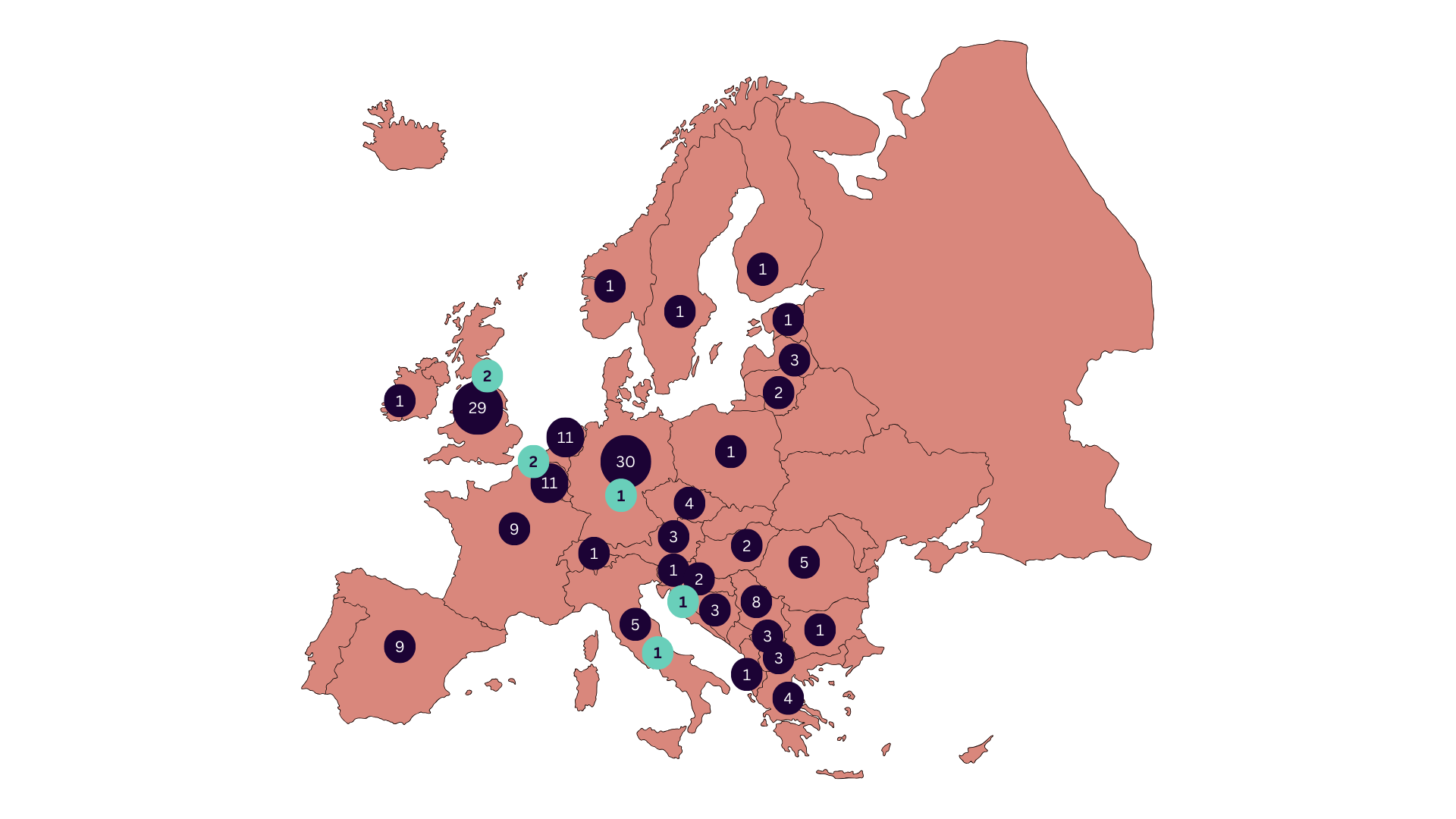What we learnt from the Ecosystem Grants Programme open call
This summer the European AI & Society Fund opened a new funding stream offering grants of €30.000 to support public interest work around AI. Our aim was to lower the barrier for civil society to engage in this emerging field, grow our ecosystem and broaden the diversity of organisations that we support, geographically, thematically or with regards to communities directly affected by AI.
In little less than 2 months, we received 159 applications from across Europe. The Programme budget of €200.000 was enough to award grants to 7 organisations and support timely and well-founded projects of both established organisations and newcomers in this space. Nevertheless, we had to reject many brilliant and relevant projects.
Here is what we learnt.
1. Civil society recognises the momentum around AI, and the Fund needs to grow to meet the challenge.
With the available budget we were able to fund roughly 1 in 20 applications. The quality and relevance of proposals was high, and with more budget we could have funded at least 3 times as many applicants.
The high demand demonstrates the widespread recognition that AI is an important challenge and the opportunity to shape its direction is now. But not only. It is also indicative of the fact that very few foundations organise open calls, instead inviting prospective grantees to apply for funding in a closed process. So, when an open call comes up, organisations go for it.
What does it mean for us? The rapid roll-out of AI systems is creating tangible impacts on communities right now, at the same time as policymakers grapple with putting in place regulations. Civil society wants and needs to undertake this work now, and to meet this challenge, we need to grow the available funding to properly resource the field.

Chart: Proportion of applications we were able to fund from our two latest calls.
2. Growing the diversity of our ecosystem – organisation by organisation.
Geographically and thematically, this call reached organisations and groups that we had not reached before. With every new call, the diversity of applications has increased. Running an open call has helped us to understand the broader field as well as to support work that we would not otherwise be able to identify.

Image: Geographical distribution of Ecosystem Grants Programme applications and the funded projects.
It was striking to receive proposals from people that are starting to experience the impacts of the hyper-scaling of generative AI. For example, unions of creative professionals wanted to organise and represent their interests in response to this technological change. We also saw another new thematic cluster emerge around rethinking AI’s place in society and building alternatives.
Similarly to our previous funding calls, there were only a few applications proposing work at the intersection of climate and technology. This continues to be a substantial gap in our ecosystem. There is a lot of space to further explore, and build connections between these two areas, something that we can learn from the Green Screen Coalition.
3. We do not fund ‘AI for good’ nor AI integration in organisations.
Some applications were more appropriate for our longer-term policy and advocacy funding while others were not a direct fit for our strategy, for example, proposals on developing ‘AI for good’, or to upskill young people. Also, a considerable number of organisations were seeking funding to integrate AI systems in their own work. It’s not the kind of work that we are currently funding. We directed applications seeking to implement AI solutions within organisations to a partner organisation that specialises in building civil society capacity in this way. For future open calls, we could consider listing examples of initiatives that we do not fund to make it more explicit and spare time and resources of applicant organisations that are not a direct fit for our work.
4. An open call run on a rolling basis doesn’t work when everyone needs funding.
The programme design did not work as we had intended. The Ecosystem Grants programme was meant to accept applications on a rolling basis, with three cut-off dates for evaluation. Instead, we had to close the programme after the first funding round, because we had allocated the entire budget on the first go.
The purpose of running a rolling-call was to provide the possibility to apply for funding as and when the need arises. Occasionally, organisations reach out with an idea for research, organising advocacy meetings or a new report. We assumed that a rolling-call is a way to deal with this kind of ad-hoc requests and had hoped for a lightweight administration. Instead, the response to the call was overwhelming. As said – when an open call finally comes up, organisations will go for it immediately.
5. Operating within the limits of a small team.
The unexpectedly high volume of applications in combination with the resources of a small team revealed limitations that we had not accounted for. We had promised a quick turnaround from application to grant decision in a month. Reading and evaluating 159 applications and prioritising getting the money out to organisations as soon as possible, made it impossible to provide detailed individual feedback to the rejected applicants. We recognise that generic feedback that we were able to provide is far less useful for organisations to make sense of why they got rejected and what we as a funder do want to fund.
Looking ahead, one of the solutions for the future could be to categorise rejected applications into clear categories making it easier to provide granular feedback, when delivering detailed individual feedback is not feasible.
We also learnt that administering €200.000 or €2 million through an open call, if the number of applications is equally high, administratively does not make a big difference to the work of the team. However, we continue to see the value of offering smaller grants – something that other funders are often unwilling or unable to do.
We continue to think about our practices and welcome both support and challenge to make our work better. If you have ideas for improving how we fund, please let us know on info@europeanaifund.org